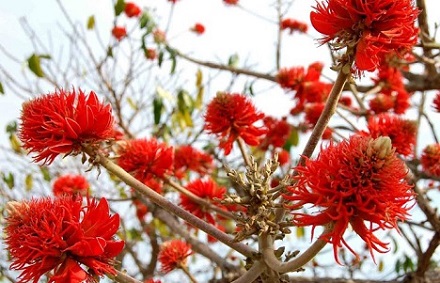Indonesian And Malaysian Scientists Discover ACE-2 Inhibitors For Use In COVID-19 Treatments From Phytochemicals Found In Erythrina Genus
Nikhil Prasad Fact checked by:Thailand Medical News Team May 22, 2024 10 months, 3 weeks, 2 days, 13 hours, 5 minutes ago
Herbs And Phytochemicals: As the world continues to grapple with the COVID-19 pandemic, the search for effective treatments remains a top priority. Recently, a team of Malaysian scientists has identified two phytochemicals, gangetinin and erybraedin D, from the genus Erythrina as potential inhibitors of the angiotensin-converting enzyme 2 (ACE2) receptor. This discovery could pave the way for new treatments to combat the virus.
 Scientists Discover ACE-2 Inhibitors For Use In COVID-19 Treatments \
Scientists Discover ACE-2 Inhibitors For Use In COVID-19 Treatments \
From Phytochemicals Found In Erythrina Genus
The Significance of ACE2 in COVID-19
The ACE2 receptor plays a crucial role in the entry of the SARS-CoV-2 virus into human cells. By binding to ACE2, the virus gains access to the host cell, facilitating infection and replication. Therefore, blocking this interaction has become a key target for COVID-19 treatments. Targeting ACE2 could also reduce the likelihood of the virus developing resistance, as this approach focuses on host cell proteins rather than the virus itself.
Exploring Flavonoids from Erythrina
The genus Erythrina is known for its rich content of flavonoids, which have shown promise as antiviral agents in recent studies. Flavonoids are natural compounds found in many plants and have been noted for their antiviral, anti-inflammatory, and ACE2 inhibitory properties. In this study, researchers conducted a comprehensive screening of 473 flavonoids derived from Erythrina to identify potential drug candidates for COVID-19.
Methodology
The
Herbs And Phytochemicals research team from Universitas Padjadjaran-West Java, Indonesia and Universiti Kebangsaan Malaysia-Selangor, Malaysia employed a multi-step approach to identify and evaluate potential ACE2 inhibitors:
-Toxicity Screening: The structures of 473 flavonoids were screened for potential toxicity, including mutagenicity, hepatotoxicity, and inhibition of the human ether-a-go-go-related gene (hERG).
-Pharmacokinetic Evaluation: Non-toxic flavonoids were further assessed for their pharmacokinetic properties, such as absorption, distribution, metabolism, and excretion.
-Molecular Docking and Dynamics Simulations: Flavonoids that passed the initial screenings were analyzed for their interactions with the ACE2 receptor using molecular docking and molecular dynamics simulations.
Results
Of the 473 flavonoids screened, 104 were predicted to be safe, non-toxic compounds. Among these, 18 flavonoids were identified as not being substrates of P-glycoprotein (P-gp), a protein that affects drug absorption and bioavailability. Two flavonoids, gangetinin and erybraedin D, emerged as the most promising candidates due to their low binding affinities and stable interactions with the ACE2 receptor.
/>
Gangetinin (471): This compound exhibited favorable binding properties and stable interactions with the ACE2 receptor. Its physicochemical attributes suggest it has drug-like properties.
Erybraedin D (310): Similarly, erybraedin D showed stable binding to the ACE2 receptor and met the criteria for drug-likeness.
Implications for COVID-19 Treatment
The identification of gangetinin and erybraedin D as potential ACE2 inhibitors is significant. By blocking the ACE2 receptor, these compounds could prevent the SARS-CoV-2 virus from entering human cells, thereby inhibiting infection and replication. This approach offers a promising alternative to directly targeting the virus, potentially reducing the risk of resistance.
Virtual Screening and Drug Discovery
Virtual screening is a powerful tool in drug discovery, allowing researchers to rapidly evaluate large libraries of compounds. In this study, virtual screening was instrumental in narrowing down the list of potential ACE2 inhibitors from 473 flavonoids to two promising candidates. This approach saves time and resources, enabling more efficient drug development.
Toxicity and Pharmacokinetic Predictions
Ensuring that potential drugs are safe and effective is crucial. The toxicity screening in this study predicted that both gangetinin and erybraedin D are unlikely to be mutagenic, hepatotoxic, or hERG inhibitors. These predictions are important, as they suggest that these compounds are less likely to cause genetic mutations, liver damage, or cardiac arrhythmias.
The pharmacokinetic evaluations further supported the potential of gangetinin and erybraedin D as drug candidates. Both compounds were predicted to have high intestinal absorption, low water solubility, and high permeability. These properties suggest that the compounds can be effectively absorbed and distributed in the human body.
Molecular Dynamics Simulations
Molecular dynamics simulations provided further insights into the interactions between the flavonoids and the ACE2 receptor. These simulations indicated that the binding of gangetinin and erybraedin D to ACE2 is stable over time, with favorable binding energies. This stability is crucial for the effectiveness of potential drugs.
Drug-Likeness and Lipinski's Rule of Five
Assessing drug-likeness is a key step in drug development. Both gangetinin and erybraedin D met the criteria of Lipinski's Rule of Five, which includes molecular weight, lipophilicity, and hydrogen-bonding properties. These criteria help predict the oral bioavailability and overall drug-likeness of compounds.
Discussion and Future Directions
The discovery of gangetinin and erybraedin D as potential ACE2 inhibitors highlights the therapeutic potential of flavonoids from the genus Erythrina. These compounds could provide a new avenue for COVID-19 treatment, particularly given the ongoing challenges with virus mutations and resistance.
However, while the in silico and computational studies are promising, further research is needed. The next steps include in vitro experiments to validate the inhibitory effects of these compounds on the ACE2-RBD interaction. If successful, these flavonoids could move into clinical trials, bringing us closer to effective COVID-19 treatments.
Conclusion
The identification of gangetinin and erybraedin D as potential ACE2 inhibitors marks a significant step forward in the fight against COVID-19. These flavonoids, derived from the genus Erythrina, have shown promising results in computational studies and could offer a new approach to preventing and treating the virus. As research continues, these compounds could become valuable additions to our arsenal against the pandemic, providing hope for more effective treatments and improved patient outcomes.
The study findings were published in the peer reviewed journal: Dovepress.
https://www.dovepress.com/bioinformatics-study-of-flavonoids-from-genus-erythrina-as-ace2-inhibi-peer-reviewed-fulltext-article-AABC
For the latest on
Herbs And Phytochemicals, keep on logging to Thailand Medical News.
Check Out:
https://www.thailandmedical.news/articles/covid-19-herbs
https://www.thailandmedical.news/articles/herbs-and-phytochemicals
https://www.thailandmedical.news/articles/thai-herbs-and-supplements
